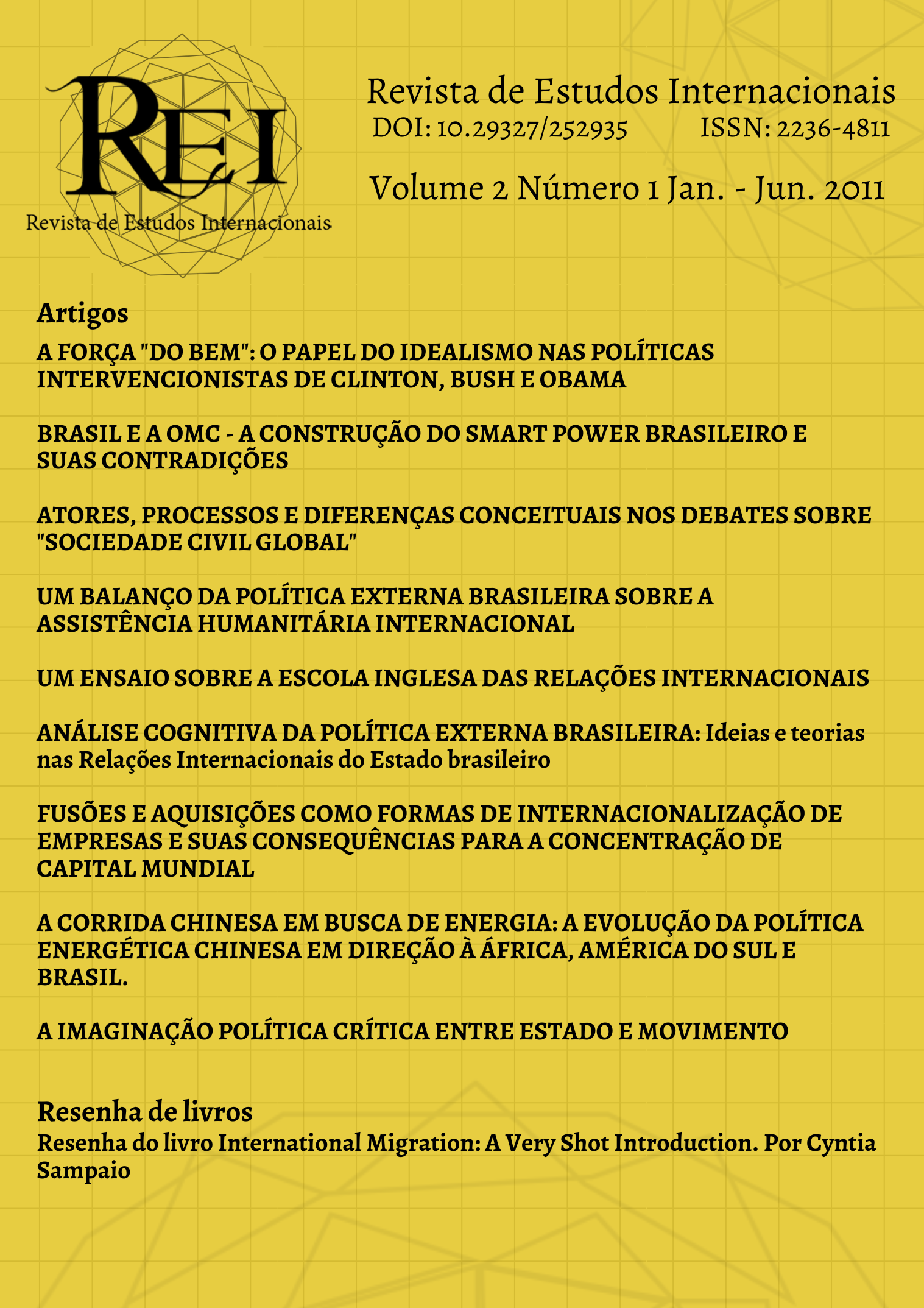A IMAGINAÇÃO POLÍTICA CRÍTICA ENTRE ESTADO E MOVIMENTO
Palavras-chave:
Política Mundial, Soberania Estatal, Movimentos Sociais, MarxismoResumo
Partindo das rupturas políticas – simbolizadas pelo ano de 1989 – nos planos teórico e prático, este artigo busca estudar a imaginação política crítica contemporânea. Tomando este fio condutor, o presente estudo intenta criticar o estado-centrismo de alguns teóricos (Rosenberg e Colás) de hoje. Ainda, propõe uma leitura de outro crítico (Walker), visando apreender estes limites imaginativos e sugerir – com auxílio da prática de certos movimentos sociais – outros modos de pensar os dilemas da soberania estatal e sua inclusão e exclusão do espaço político.
Referências
ANDERSON, P. (1977) Sur le marxisme occidental. Paris: Maspero.
ASHLEY, R. K. (1984) The poverty of Neorealism. International Organization, 38 (2): 225-86.
BASCHET, J. (2002) L'étincelle zapatiste: insurrection indienne et résistance planétaire. Paris: Denoël.
BECKETT, S. (2002 [1947]) Fim de partida. São Paulo: Cosac & Naif.
CAMPBELL, D. (1994) Political excess and the limits of imagination. Millennium: Journal
of International Studies, 23 (2): 365-75.
COLÁS, A. (1994) Putting cosmopolitanism into practice: the case of socialist
Internationalism”. Millennium: Journal of International Studies, 23 (3): 513-34.
_____________. International civil society. Cambridge: Polity Press, 2002.
_____________. (2003) The power of representation: democratic politics and global governance. In: AMSTRONG, D.; FARELL, T.; MAIGUASHCA, B. Governance and Resistance in World Politics. Cambridge: Cambridge University Press, p. 97-118.
COX, R. W. (1986) Social forces, states and world orders: beyond International Relations Theory. In: KEOHANE, R. O. Neorealism and its critics. New York: Columbia University Press.
DERRIDA, J. (1993) Spectres de Marx: l’État de la dette, le travail du deuil et la nouvelle Internationale. Paris: Galilée.
_____________ (2004) Je suis en guerre contre moi-même. Le Monde. 19 ago.
GRAMSCI, A. (1991) Maquiavel, política e Estado moderno. Rio de Janeiro: Civilização
Brasileira.
INAYATULLAH, N.; BLANEY D. (2004) International Relations and the problem of
difference. London: Routledge.
LINKLATER, A. (1990) Beyond Realism and Marxism: Critical Theory and
International Relations. London: Macmillan.
_____________. (1998) The transformation of political community: ethical foundations
of the Post-Westphalian Era. Columbia: University of South Carolina Press.
LÖWY, M.; SAYRE R. (1995) Revolta e melancolia: o romantismo na contramão da modernidade. Petrópolis: Vozes.
MAGNUSSON, W. (1994) Social Movements and the Global City. Millennium: Journal of International Studies, 23 (3): 621-45.
MAIGUASHCA, B. (203) Governance and resistance in World Politics. In: AMSTRONG, D.; FARELL, T.;
MAIGUASHCA, B. Governance and Resistance in World Politics. Cambridge: Cambridge University Press, p. 3-28.
NEUFELD, M. (1995) The restructuring of International Relations Theory. Cambridge: Cambridge University Press.
ROSENBERG, J. (11994) The empire of civil society. London: Verso.
SCHOLTE, J.A. (2001) Civil society and democracy in global governance. CSGR Working
Paper, n.65.
SMITH, S. (1994) Rearranging the deckchairs on the ship called modernity: Rosenberg, epistemology and emancipation. Millennium: Journal of International Studies, 23 (2): 395-405.
_____________. (1996) Positivism and beyond. In: SMITH, S. (Ed.) International Theory: positivism and beyond. Cambridge: Cambridge University Press, p. 11-44.
WALKER, R. B. J. (1984) East wind, west wind: civilizations, hegemonies, and world orders. In: WALKER, R. B. J. (Ed.) Culture, Ideology and World Order. Boulder: Westview Press, p. 2-22.
_____________. (1988) One world, many worlds: struggles for a just world peace. Boulder: Lynne Rienner.
_____________. (1993) Inside/Outside: International Relations as Political Theory. Cambridge: Cambridge University Press.
_____________. (1994) Social movements/World Politics. Millennium: Journal of International Studies, 23 (3): 669-700.
_____________. (1995) From International Relations to World Politics. In: CAMILLERI, J. A.; JARVIS, A. P.; PAOLINI, A. J. The State in Transition: Reimagining Political Space. Boulder: Lynne Rienner Publishers.
_____________. (2002) After the future: enclosures, connections, politics. In: FALK, R.; RUIZ, L.; WALKER, R. B. J. (Eds.) Reframing the International: law, culture, politics. New York: Routledge.
_____________. (2003) Polis, cosmopolis, politics. Alternatives: Global, Local, Political, 28 (2): 267-86.


